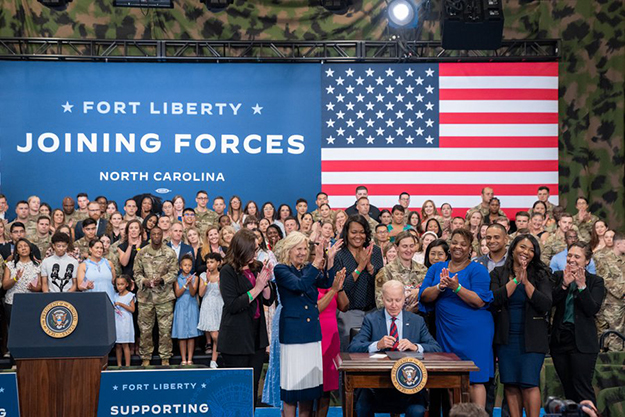WASHINGTON (AFNS) -The Justice Department announced July 14 that it has issued a letter to all state licensing authorities about new employment-related federal protections for military families. The letter informs state licensing authorities about Congress's recent amendment to the Service members Civil Relief Act that allows service members and their spouses to use their professional licenses or certificates in new jurisdictions if they are relocating because of military orders and meet certain other requirements.
"Service members and their families should not face unnecessary barriers to employment because of the sacrifices they make in service to our country," said Attorney General Merrick B. Garland. "The?guidance we are issuing today reflects the Justice Department's commitment to honoring our nation's service members and their families not just with words, but also with action." "Service members bear great burdens to protect and advance our democracy and families of these dedicated military professionals often make sacrifices on our behalf, including frequent moves, child-care challenges and interruptions or barriers to employment," said Assistant Attorney General Kristen Clarke of the Justice Department's Civil Rights Division. "The resources that we are making available should empower many service members and military spouses with professional licenses to better navigate the burdens that can result from frequently moving around the country."
In January 2023, Congress added a new provision to the SCRA - a law that provides service members and their families with a wide variety of financial and housing protections - to make it easier for service members and military spouses to have their professional licenses recognized when they relocate to another state due to military orders. The new SCRA license portability provision provides that service members and military spouses can have their out-of-state licenses recognized as valid in the new state while they are stationed there so long as they meet certain requirements.
The letter to state licensing authorities explains how the SCRA's license portability provision reduces the administrative hurdles that service members and their spouses face when they move across state lines. The documents explain the requirements service members or their spouses must meet to have their license or certificate recognized as valid under this new law. The department released a fact sheet about the SCRA's license portability provision. Portions of the department's SCRA's license portability provision are included in sidebar on this page.
To qualify for Professional License Portability under the SCRA, You must:
1. Have moved to a location outside the jurisdiction of the licensing authority that issued the covered license or certificate because of orders for military service.
2. Provide a copy of the military orders to the licensing authority in the new jurisdiction.
3. Have actively used the license or certificate during the two years immediately preceding the move.
4. Remain in good standing with: a. the licensing authority that issued the covered license or certificate; and b. every other licensing authority that issued a license or certificate valid for a similar scope of practice and in the discipline applied for in the new jurisdiction.
5. Submit to the authority of the licensing authority in the new jurisdiction for the purposes of standards of practice, discipline, and fulfillment of any continuing education requirements.
If these five criteria are met, the service member's or spouse's covered license or certificate shall be considered valid at a similar scope of practice and in the discipline applied for in the new jurisdiction for the duration of the military orders.





Read Comments